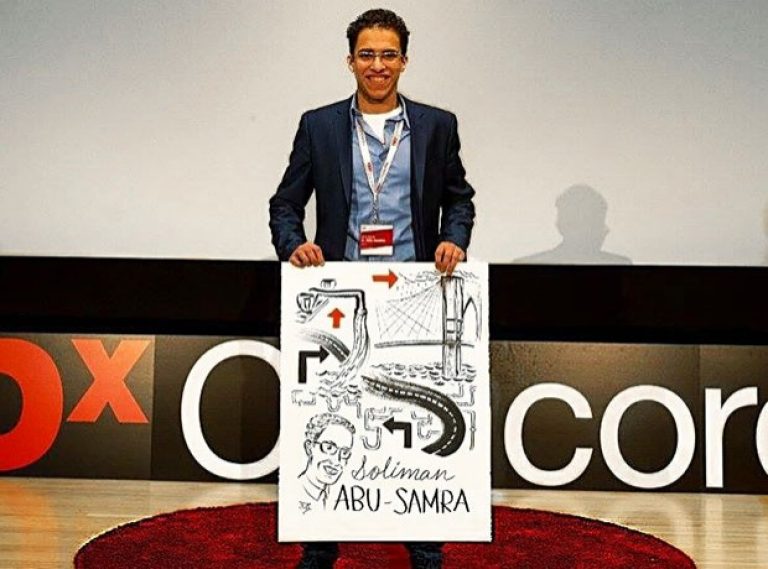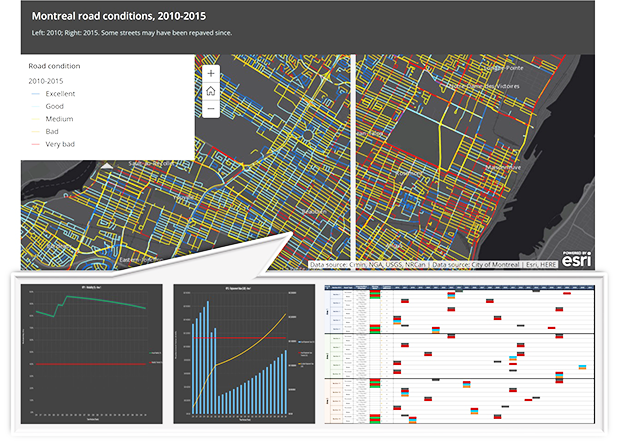PhD student has a plan to fix Montreal's potholes

Communities all over the world struggle with road maintenance, but potholes hold a special place in the imagination of Montrealers.
Every day, an estimated 1,200 potholes are fixed in the city, yet vehicles continue to bounce, jerk and swerve on narrow side streets and major highways.
Concordia grad student Soliman Abu-Samra says the problem could be dealt with more effectively by using geographic data to manage infrastructure maintenance.
Currently he’s working with the City of Montreal to develop plans for maintaining a wide range of city infrastructure, from roads to bridges to sewage facilities.
Abu-Samra is pursuing his PhD in Civil Engineering at Concordia University under the supervision of Tarek Zayed, a professor in the Department of Building, Civil and Environmental Engineering.
The impact of my research would be felt by our community

How does this specific image relate to your research at Concordia?
My research focuses on corridor infrastructure, which is best displayed on a Geographic Information System (GIS). Corridor infrastructure refers to roads, water, and sewer and wastewater networks. This image is a GIS map that visualizes the condition of the roads in Montreal in 2010 on the left and 2015 on the right.
I am working on the development of similar GIS maps that incorporate further information for multiple assets such as deterioration, scheduled repair time, last repair time and financial information.
That information will help decision makers allocate their budgets and enhance the overall network level of service by creating an optimized repair schedule for municipal infrastructure.
There is a dire need to coordinate corridor interventions and repair all networks at the same time, rather than let some deteriorate while all attention is focused on a different network.
What is the hoped-for result of your project? And what impact could you see it having on people's lives?
The hoped-for result of my project is to help municipalities more efficiently manage their infrastructure maintenance budget. This includes developing a contractual scheme similar to a public-private partnership (PPP) to act as a funding option for our struggling governments, and integrating an asset-management system to reduce public disruption and save time and money.
To optimize their budgets, municipalities also need to ask which assets or corridors need to be repaired, when is the optimum time to undertake the repair action and what is the best long-lasting repair action.
The impact of my research would be felt by our community. People would experience safer and non-rusting bridges, non-crumbling roads with fewer potholes, better water quality and minimized road closures.
For our government, the impact would be an optimized repair schedule that maintains an acceptable level of service within the available budget. The backlog of delayed repairs, estimated at $123 billion in 2007, is increasing by $2 billion annually.
What are some of the major challenges you face in your research?
The major challenges facing my research are the high uncertainty of how infrastructures behave and a lack of sufficient historical data. Since we are dealing with numerous assets with varying varying life cycles — for example, roads that last 15-20 years, water and sewer networks that may last 80-100 years — there exists high uncertainty in forecasting their condition.
Uncertainty affects the decision-making process when it comes to efficiently allocating the budget. Thus, there is a need to utilize some probabilistic-based techniques.
Technological advancements in big data and artificial intelligence gave us tremendous analytical power, which I am unable to benefit from due to the lack of sufficient historical data. Thus, there is a need to rely on experts’ opinions to fill the gaps.
What person, experience or moment in time first inspired you to study this subject and get involved in the field?
I was in a horrible car accident in my home country, Egypt, that almost got me killed. I was driving home after finishing a group project late at night when all of a sudden, I found two lanes closed for road maintenance without properly placed safety signs and warning alerts.
I lost control of the car and it hit the concrete blocks placed on the right side of the highway. It spun around and fell three metres into the excavated area. I lost conscious and was bleeding from my head and leg. The car was totally destroyed. People on the highway stopped their cars and called an ambulance.
My injuries took months to heal, but the hidden value of this experience was the motivation it gave me to explore the area of infrastructure management.
Since I was studying civil engineering, I was able to understand the issues and propose practical solutions to overcome inefficiencies and financial burdens imposed by under-performing infrastructure. It even culminated in the choice of my masters’ thesis topic: life-cycle cost modeling for road infrastructure.
How can interested STEM students get involved in this line of research? What advice would you give them?
There are different technical and computational paths in this research, such as building databases to store the data and carry out analysis, assessing the condition of different infrastructure systems, predicting future conditions to estimate annual budgets, or optimizing the expenditure of your annual budget using different algorithms.
In summary, this type of research involves an “explore, understand, build, validate, and analyze” approach. It requires motivation and patience, as the present problems have been around for decades. Be ready to experience sleepless nights, and prepare your reading glasses — even if don’t wear them now, you will eventually!
What do you like best about being at Concordia?
It has been a remarkable experience for me. The well-structured and coherent Civil Engineering Graduate Program stands out in terms of modern technology, software, and state-of-the-art applications.
It offered me a unique opportunity to work with professors and fellow researchers who are pioneers in their areas of study. It also gave me the opportunity to develop long-lasting friendships with numerous graduate students whom I was happy to help throughout my mandate as president of the Graduate Students Association.
Are there any partners, agencies or other funding/support attached to your research?
We have worked with various industry partners on different projects. Lately, we have worked with the City of Montreal to enhance the precision of their newly installed leak-detection equipment (noise loggers) and to conduct a benefit/cost analysis for expanding their coverage all over the city.
I had several meetings with City of Montreal officials over the course of the project. Their exceptional support and guidance is much appreciated. I have also received funding from Mitacs.
Watch Soliman Abu-Samra’s TEDxConcordia talk and his appearance on MAtv.


